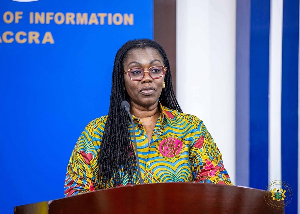


 Minister of Communication and Digitalisation, Ursula Owusu-Ekuful
Minister of Communication and Digitalisation, Ursula Owusu-Ekuful
Artificial Intelligence (AI) driven innovations can help promote inclusive economic growth, benefit society significantly and empower individuals, Minister of Communication and Digitalisation, Ursula Owusu-Ekuful, has said.
“It is no longer news that AI will be a driving force behind the fourth industrial revolution. The question is: How can AI’s potential in Africa and Ghana be best harnessed?, she asked, adding that as the debate on the adoption and use of AI continues to gain momentum, it is important the country takes steps to harness its full potential.
She made this statement at the launch of Readiness Assessment Measure (RAM) in Accra, organised by the United Nations Educational, Scientific and Cultural Organization (UNESCO) in collaboration with the Ministry of Communication and Digitalisation and the Data Protection Commission.
The event, theme ‘National stakeholder workshop on ethics of AI: catalysing AI readiness in Ghana’, sought to convene a multi-sectoral stakeholder group and discuss the nation’s current AI landscape while raising awareness on the ethical implications and societal impacts of AI technologies.
The event also aimed to introduce international frameworks, guidelines and best practices for AI.
The minister noted the need for responsible AI development and its use to drive Ghana’s achievement of the African Union’s Agenda 2063.
“The responsible development and use of AI can drive the country to achieve the African Union’s Agenda 2063 and the United Nations Sustainable Development Goals (SDGs),”she mentioned.
According to Mrs. Owusu-Ekuful, the benefits brought by the adoption and use of AI can improve the work environment and quality of life and create the potential for attaining a human-centred future society with opportunities for everyone, including women and girls, as well as vulnerable groups.
She said the regulation of AI and the development of appropriate frameworks to ensure the ethical application of AI technologies to support humanity is at the embryotic stage across nations, especially in Africa, mentioning that Ghana has a unique opportunity to learn from the steps and errors of others while developing an approach to the ethical use of AI and related technologies that supports the development of society, promotes social cohesion, empowers individuals and communities and reflects the ethics of Ghanaian society.
“The government, with technical support from UNESCO, is taking proactive steps to assess and promote the resilience of existing laws, policies and institutions related to AI adoption and implementation in the country.
This, along with the alignment of the AI systems with the values and principles set out in the UNESCO Recommendation on the Ethics of Artificial Intelligence (AI) using the AI readiness assessment methodology (RAM), will ensure a robust regulatory framework,” she said.
“Based on these comprehensive needs assessments, UNESCO and the Government of Ghana will co-design strategic AI frameworks, the corresponding regulatory frameworks and the institutional capacities to promote the ethical development and use of AI in priority areas,” she added.
The workshop launched the 12-member National Steering Committee of experts constituted to oversee the assessment of AI Readiness in Ghana and provide the platform for critical discussions aimed at integrating ethical considerations into the national and state-level AI strategic programmes by ensuring that the deployment of AI technologies aligns with public welfare and adheres to international standards.
She called upon all stakeholders, including government agencies, private sector companies, academic institutions, civil society organisations and the public, to participate actively in this process. She urged them to work together to ensure that AI technologies are developed and used to benefit all members of the society, particularly the marginalised and vulnerable.
“I end by reiterating that the launch of the Readiness Assessment Measurement (RAM) tool marks a significant step forward in our journey toward digital transformation and the use of ethical AI. It is a testament to our commitment to harnessing the power of AI responsibly, guided by the values and principles outlined in the UNESCO Recommendation,” said the Minister.
In a presentation, the Programme Specialist Section for Bioethics and the Ethics of Science and Technology – UNESCO Headquarters, James Wright, introduced the recommendation on the Ethics of Al adopted by acclamation by 193 member-states of UNESCO, 23rd November 2021.
Speaking on the framework, he mentioned: “Principles were there for many years, but the recommendation goes into details of actions to ensure accountability, responsibility, transparency and necessary regulations to ensure the rule of law”.
He said the recommendation includes several action-oriented cross-sectoral policy chapters covering data policy, gender, development & international cooperation, environment & ecosystems, health and social well-being, communication and information, education and research, economy and labour and culture.
The UNESCO recommendation framework is based on interconnected values and principles which include the prioritising of proportionality, safety, fairness, sustainability, privacy, human oversight, transparency, responsibility, awareness and multi-stakeholder collaboration to ensure ethical and beneficial outcomes.
According to Mr. Wright, the recommendation recognises that AI is constantly evolving and, therefore, countries’ readiness to develop, implement and use AI must be evaluated dynamically. This means that ensuring AI systems align with agreed-upon ethical principles requires a flexible methodology that can identify and address AI’s challenges and shortcomings.
Patricia Adusei-Poku, the Executive Director of the Ghana Data Protection Commission, in a presentation, mentioned that by 2033, people living in Ghana will experience a transformed society where Al advances the potential of people, government, businesses and systems to achieve inclusive, social and economic transformation and quality of life.
“Ghanaians would have the capabilities and enabling environment to be competitive in the global digital economy, positioning Ghana as an Al hub in Africa.”
Watch the latest edition of BizTech below:
Ghana’s leading digital news platform, GhanaWeb, in conjunction with the Korle-Bu Teaching Hospital, is embarking on an aggressive campaign which is geared towards ensuring that parliament passes comprehensive legislation to guide organ harvesting, organ donation, and organ transplantation in the country.
Click here to follow the GhanaWeb Business WhatsApp channel